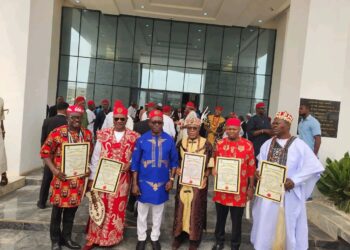Chinedum Treasure
A rights group, Rule of Law and Accountability Advocacy Centre (RULAAC) has urged the Nigerian Military to drastically reduce its militarization of the civic space and limit its role in internal security to special circumstances.
Executive Director of RULAAC, Okechukwu Nwanguma made the call in a presentation during the 3rd edition of the Nigerian Army Human Rights seminar held at the 81 Division Officers Mess, Outer Marina, Victoria Island, Lagos.
The seminar which had as its theme, ‘Human Rights and National Security: A strategic balance, is in line with the Chief of Army staff’s philosophy of repositioning the Nigerian Army, and attracted various civil society organizations and legal practitioners.
According to Nwanguma, concerns abound, about the militarization of the southeast, particularly military checkpoints and reports of harassment, which can not be overlooked.

He said the military’s role in internal security must be limited to special circumstances, preserving its integrity and mission, while the relationship between military personnel and police must also be addressed to prevent hostility and promote accountability.
Nwanguma highlighted the various violations tied to military operations, including discrimination, torture, and gender-based violence, noting that addressing these issues, especially in vulnerable populations such as women and children, is vital in maintaining human rights standards.
Harping on the need for the military to deemphasize reprisal attacks on the civilian population, the RULAAC boss said its repercussions can lead to collective punishment, resentment, and a cycle of violence.
“Clear limitations on human rights in military operations must be established to prevent abuse and impunity. A commitment to international conventions and accountability for violations by all parties is imperative for fostering trust and legitimacy.
“It is important also to state that failure to investigate allegations of human rights violations contributes to an atmosphere of impunity, as it emboldens officers to repeat such acts,” he insisted.
He advocated a multidimensional approach, including community engagement and addressing socio-economic issues, as necessary to mitigate insecurity effectively.
Nwanguma pointed out, however, that organizing the seminar on human rights is an acknowledgement by the organizers that there are gaps in human rights and due process observance in counter-insurgency and other military operations across the country.
He also expressed optimism that the military understands that addressing the gaps is essential for restoring public trust, building partnerships, and ensuring the legitimacy of military actions which are essential for effectiveness in realizing the operational objectives of the army.
Earlier, the Chief of Army Staff, Lieutenant General Taoreed Lagbaja noted that the approach of the Nigerian Army towards Human Rights abuses and Civilian protection in conflict areas is now being taken more seriously.
Lagbaja, who was represented by the General Officer Commanding the 81 Division, Major General Farouk Mijinyawa, said the new approach of the Force is to strengthen the non-kinetic approaches to military operations, assuring that the Nigerian Army is trained to conduct operations in line with humanitarian laws and authorized rules of engagement.
In his remarks, the Chief Judge of Lagos state, Justice Kazeem Alogba, represented by Justice Raman Oshodi urged the military to always uphold human dignity in carrying out operational activities.
Justice Oshodi spoke on the issue of Anti-torture Act, stating that it aligns with the International Charter Act.






